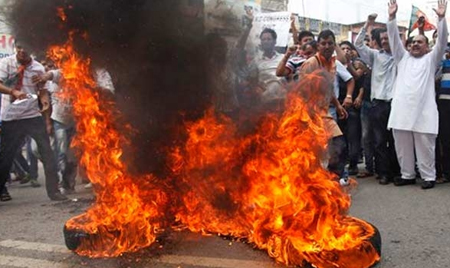 Jammu, Aug 12: Jammu and Kashmir's MoS home Sajjad Ahmad Kitchloo tendered his resignation on Monday amid widespread communal violence in Kishtawar district.
Jammu, Aug 12: Jammu and Kashmir's MoS home Sajjad Ahmad Kitchloo tendered his resignation on Monday amid widespread communal violence in Kishtawar district.
Kitchloo said his consciousness didn't allow him to head the police department since J&K chief minister Omar Abdullah had ordered a judicial probe into the clashes.
Kitchloo, before announcing this resignation, in a hurriedly called press conference, said,“I take strong exception to the remarks made by Arun Jaitley, leader of opposition in Rajya Sabha. Did Gujarat chief minister Narendra Modi resign after Godhra riots? Did Amit Shah - Modi’s principal poll campaigner, resign?”
MoS home has been blamed by all political parties for the communal clashes in Kisthwar which claimed three lives.
Following the violence, curfew was implemented in all major towns of 10 districts in Jammu province and has remained so for the last three days.
Kitchloo, representative of National Conference from Kishtwar Assembly constituency, was induced in the cabinet early this year.
His resignation came about 12 hours after four police personnel were injured and vehicles were torched by miscreants in Kishtwar town, 250 km from Jammu, late last night in defiance of curfew orders.
The situation in 14 towns of 10 districts of Jammu division continues to be tense. The Army has already been placed in these areas.
“Police personnel were attacked by miscreants in Shalimar area of Kishtwar town. They attacked them with stones and also torched some vehicles. The condition of police personnel continues to critical,” said a police spokesperson.
J-K chief minister announced a judicial inquiry into the Kishtwar incident on Monday.
Earlier, he had announced an inquiry by the divisional commissioner, which failed to satisfy the Congress, their coalition partner.
Pradesh Congress Committee president Prof Saifud-din Soz had said on Sunday evening that the chief minister had to ensure that the inquiry by the divisional commissioner would be adequate.





Comments
Add new comment